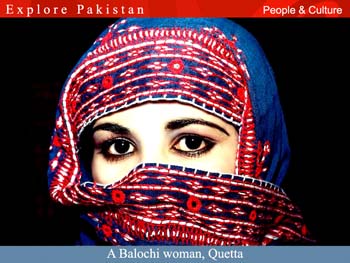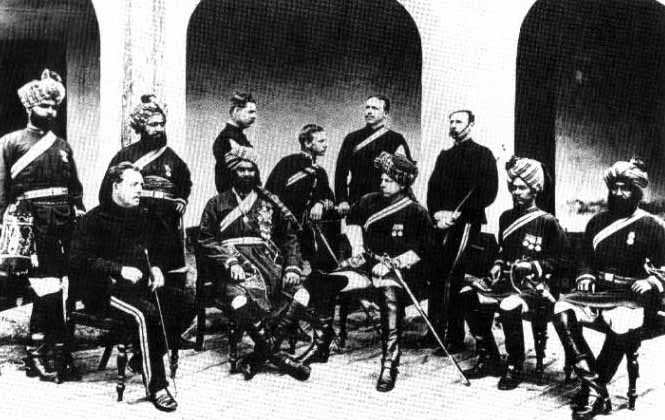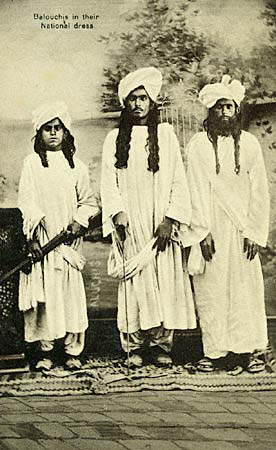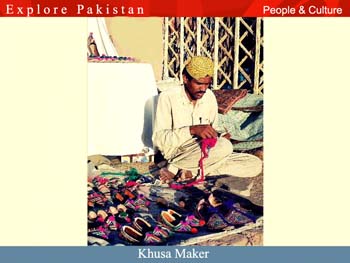|
[Ethnic
Groups] [The
Baloch] [People
of Sindh] [People
of Punjab] [Saraiki
People] [Pashtuns
People] [Muhajir
Urdu-Speaking People] [Mountain
Tribes] [Religions]
[Languages]
[Festivals]
[Arts
& Culture] [Folktales
From Pakistan]
[Music
& Dance] [Art
& Craft] [Art
Gallries & Museums]
[Cuisine
of Pakistan] [National
Symbols of Pakistan]
[Slide
Show]
PEOPLE OF
BALOCHISTAN: THE BALOCH
The Baloch or
Baluch (بلوچ) are the majority ethnic inhabitants of the
region of Balochistan in the southeast corner of the Iranian
plateau in Southwest Asia, including parts of Iran,
Afghanistan, and Pakistan. It is believed that they belong
to the larger Iranian peoples.

The Baloch people speak Balochi, which is a branch of the
Iranian languages. They mainly inhabit mountainous terrains,
which have allowed them to maintain a distinct cultural
identity and resist domination by neighboring rulers. The
Baloch are predominantly Muslim, with most belonging to the
Hanafi school of Sunni Islam. Some 60 percent of the total
Baloch population live in Pakistan. About 25 percent inhabit
the contiguous region of southeastern Iran. In Pakistan the
Balochi people are divided into two groups, the Sulaimani
and the Makrani, separated from each other by a compact
block of Brahui tribes.
Despite
contrasts and a variety of economic and cultural patterning
– the Baloch social structure remains tribal. Tribal society
is in all cases governed by a very definite constitution and
system of laws regulating marriage, inheritance, religious
observance, dispute resolution, decision-making, duties,
rights and so forth. The Tribal society is the social system
organized around extended family relations where rights and
duties are conferred by tribal law, based on relationships
of kinship. Baloch society has been formed through many
influences; among the most important are tribalism and
nomadism.
HISTORY / ORIGIN:
The
South-Western region of Pakistan surrounded by the Afghan
and Iranian borders is Balochistan. This is the largest
province by area of the country. Historians suggest that
Balochi people are directly descended from Amir Hamza, one
of Muhammad’s uncles and they migrated into the
transnational area of Balochistan from Syria. These
migrations from Syria mainly occurred in about 5th century
and were almost completed by the end of 7th century. Until
the 12th century, Balochistan was inhabited by independent
semi-nomadic groups, organized under respective clans. With
the passage of time, the population of this region increased
giving rise to the present tribal system in the area.

Officers of
the 27th Bombay Native Infantry (1st Balochis), made up of
Balochs, from the
British Indian Army circa 1867.
Historians
have several opinions about the origin of the name Baloch.
Some suggest that with the arrival of Iranian tribes called
Baluch, the province began to be known as Balochistan and
its inhabitants were called Balochis. Others also maintain
that the Baloch owe their name to Babylonian King 'Belus',
also the name of their god. Some researchers also claim that
the word Baloch is made up to two Sanskrit words
Bal meaning strength or power and
Och meaning high or magnificent.

Baloch men in
their national dress, 1910.
LANGUAGES:
The language spoken by Baloch people is Balochi.
Today only about 3% of Pakistani population speaks this
language. This language is mainly spread by nomadic tribes
and is mostly oral with rich poetry and legends passed down
by word of mouth. Jam Darang is known as the most important
Balochi writer of love ballads in Balochi culture. Balochi
is unfortunately one of the most neglected languages in the
country. Most of the inhabitants are immigrants or
government officers who don’t speak Balochi, which leads
Balochi to be rarely spoken in most of the province.
Brahui is the second most common language amongst
Balochi people. It is a language of unknown origins with
many Iranian words. Pashto is another
language spoken by the Balochs.
FESTIVALS:
The Baloch
people celebrate several social and religious festivals. The
two major Religious festivals of Eid-ul-Azha and Eid-ul-Fitr
are celebrated in the region. On these occasions people
embellish their houses, wear new dresses, prepare special
means and arrange get-togethers. One of the most popular
festivals of the region is Sibi festival
that has its roots to Mehergar, an archaeological site of
ancient human civilization. Folk music performance,
traditional dances, handicrafts stalls, cattle shows and
other amusing activities attract the people from all over
the country. Buzkashi is another popular
festival demonstrating the valor of Balochs. It is
celebrated by two teams riding on horses showing their
skills to snatch goat from the other.
ARTS AND MUSIC:
Baloch has a
rich musical culture. Music has a significant role on all
occasions except ceremonies of death. Most of the Balochi
Music is based on Zaheerag which
is a kind of melancholic music. The instruments used are
mainly a flute, locally called Nal,
Tamboora and Soroz. Thanksgiving dances are made of joy at
the time of positive weather changes and harvests, which are
collectively performed in groups. A special religious dance
is carried out by a Baloch sect known as Chogaa.
Another common Baloch folk dance is known as
Dochaap. In this dance men gather and dance in
groups, clapping hands with the movement of foot, neck and
head with rhythmical music on drums. On various occasions,
women also move in a circle clapping their hands. Other
dances include the Lewa, which is
thought to be of Arabic origin, along with Latti
and Hambo said to be
of ancient Balochi origin, are also very popular.
Baloch people
give a great importance to the occasion of birth. The
occasion is celebrated by music, singing and dancing. Women
visit and sing domestic songs such as ‘Sipath’
praise songs to the mother.

RELIGIOUS INFLUENCE:
According to
researchers, no sophisticated religious institutions are
evident in Baloch society. There are regular tribal
institutions instead of religious priesthoods. Baloch people
are distinguished for their attitude towards religious
tolerance. They have a more liberal and secular mindset
compared with the other nations across the country. Despite
the fact that Baloch are considered to be secular, Baloch
society is dominated by tribal chiefs, locally called
Sardars. Honor killings for
violating the laws are common. These traditional tribal
punishments, which contradict Pakistani as well as
International Laws, have come to the light due to awareness
campaigns of NGOs and Government Agencies.
LIFESTYLE:
Due to the
rugged and irregular terrain, agricultural activities are
difficult to carry out. The scarcity of a plentiful supply
of water is another reason for this province to remain
neglected in agricultural developments. As a result, people
mainly lead a nomadic lifestyle bringing up their animals
and moving from place to place in search of pastures. Lower
Coastal Region of the province also gives chance for
productive fishing activities and these are mostly exported.
The province is rich in mineral resources, which provide
most of the job opportunities for local people. The
entertainment in Baloch culture is limited to games, music
and dancing. The most popular among the games for the adults
is horse racing and archery. Betting on the games by
participants themselves or by on-lookers is in fashion.
Baloch people
are extremely hospitable. A guest is a mark of respect and
held in honor. Even the enemy, once entered in the house,
would get the treatment of an honored guest. On the other
hand, bravery and courage are the only criteria for getting
respect from the common folk. Everybody fully praises the
men who fall in battle, or die in avenging a wrong done to
him or his neighbor
CULTURAL DRESSES:
The cultural
dressing in Baloch tradition is very much similar to that of
Pashtuns tribes with some dissimilarity. Men usually wear a
turban, a headdress consisting of a long cloth wrapped
around head. They also wear a wide loose trouser, locally
called a shalwar with knee long
shirts, locally called qamis. The
dress of women also consists of shalwar and qamis with a
delicate embroidery work on mirror pieces. A long piece of
cloth, termed as chaddar is worn
by women cascading down the shoulders and used to cover
their heads |